马来西亚工业发展局(CIDB)资质要求和流程
马来西亚最新投资政策解读
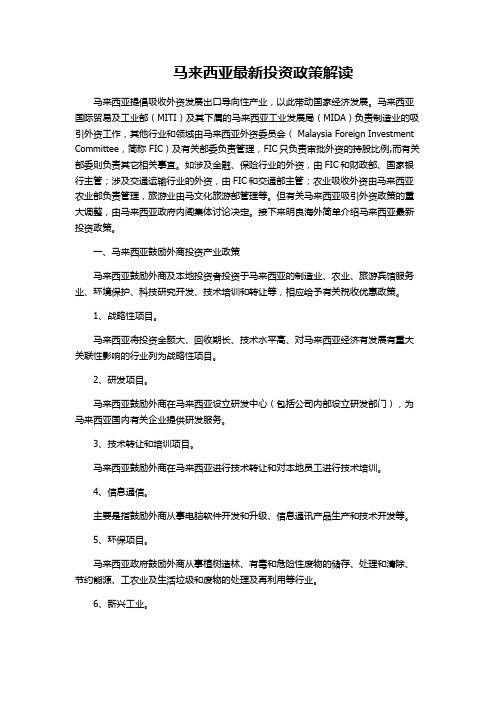
马来西亚最新投资政策解读马来西亚提倡吸收外资发展出口导向性产业,以此带动国家经济发展。
马来西亚国际贸易及工业部(MITI)及其下属的马来西亚工业发展局(MIDA)负责制造业的吸引外资工作,其他行业和领域由马来西亚外资委员会( Malaysia Foreign Investment Committee,简称 FIC)及有关部委负责管理,FIC只负责审批外资的持股比例,而有关部委则负责其它相关事宜。
如涉及金融、保险行业的外资,由FIC和财政部、国家银行主管;涉及交通运输行业的外资,由FIC和交通部主管;农业吸收外资由马来西亚农业部负责管理,旅游业由马文化旅游部管理等。
但有关马来西亚吸引外资政策的重大调整,由马来西亚政府内阁集体讨论决定。
接下来明良海外简单介绍马来西亚最新投资政策。
一、马来西亚鼓励外商投资产业政策马来西亚鼓励外商及本地投资者投资于马来西亚的制造业、农业、旅游宾馆服务业、环境保护、科技研究开发、技术培训和转让等,相应给予有关税收优惠政策。
1、战略性项目。
马来西亚将投资金额大、回收期长、技术水平高、对马来西亚经济有发展有重大关联性影响的行业列为战略性项目。
2、研发项目。
马来西亚鼓励外商在马来西亚设立研发中心(包括公司内部设立研发部门),为马来西亚国内有关企业提供研发服务。
3、技术转让和培训项目。
马来西亚鼓励外商在马来西亚进行技术转让和对本地员工进行技术培训。
4、信息通信。
主要是指鼓励外商从事电脑软件开发和升级、信息通讯产品生产和技术开发等。
5、环保项目。
马来西亚政府鼓励外商从事植树造林、有毒和危险性废物的储存、处理和清除、节约能源、工农业及生活垃圾和废物的处理及再利用等行业。
6、新兴工业。
马来西亚将本国亟待和优先发展的制造业列为“新兴工业”,后来,又将农业及服务业内优先发展的行业也列入到“新兴工业”范围内。
对于列入“新兴工业”范围内的外商投资项目,马来西亚给予税收、用地和工作准证方面的优惠鼓励措施。
浅谈马来西亚房建工程CPC与CCC竣工验收

浅谈马来西亚房建工程CPC与CCC竣工验收摘要:国外承包工程的顺利竣工验收,是承包商深感棘手的问题,由于不能及时顺利竣工验收,取得竣工证书,必然导致工期拖延,资源占压,工程款不能及时收回,使承包商经济上蒙受损失。
针对房建工程又存在专业众多,竣工验收周期长的特点,本文主要是基于厦门大学马来西亚分校一期工程的CPC与CCC竣工验收,分析和总结马来西亚房建工程竣工验收程序,为类似马来西亚房建工程顺利完成竣工验收提供借鉴。
关键词:CPC CCC 竣工验收引言马来西亚建筑工程业主方通常采用专业咨询顾问公司对承包商进行管理,主要专业为建筑师、结构和土建工程师、机电工程师等,其中建筑师为”S.O”,英文为Super Officer,翻译为总协调官,类似国内总设计师和总监理工程师角色,CPC 和CCC均为注册建筑师签署出具。
CPC是英文Certificate of Practical Completion 的缩写,翻译为实际竣工证书,即建筑师向承包商出具工程整体实际竣工验收合格后的完工证明,证明工程已经完工,施工质量已经符合设计要求,正式进入缺陷处理期,并根据合同支付承包商一半的质保金。
CCC是英文Certificate of Completion and Compliance 的缩写,翻译为工程完工和合法合规证书,是由建筑师在组织政府各部门对工程各专业进行验收并得到政府各部门出具的验收合格支持信后,向业主或者建设方出具,标志着该工程可正式投入使用和对外开放。
1 概述厦门大学马来西亚分校位于马来西亚首都吉隆坡西南约45公里,占地约61万㎡,总建筑面积将达56万㎡,一期工程主要建筑物为5栋教学楼/行政楼及其停车场,5栋宿舍楼,1栋学生餐厅、1栋学生活动中心计12栋大型建筑物及8栋小建筑,建筑面积总计为27万㎡,分5个阶段竣工验收移交,每个阶段均进行了CPC与CCC验收。
2 CPC与CCC的关系根据马来西亚建筑行业一般惯例,对承包商而言,其主要责任是在完成各专业竣工后及时向各专业咨询工程师申请验收合格后,向建筑师申请颁发CPC,对于CCC验收法定义务仅为提供签字盖章表格及保证实体完成。
马来西亚国家市场分析

马来西亚一、宏观环境(一)经济环境受投资扩张和内需增长带动,2013年马经济增长4.7%,虽低于2012年的5.6%,但符合马官方预期;2014年,马经济预计继续保持稳步增长,增幅在5%-5.5%。
自2010年马政府启动经济转型计划(ETP)以来,私人投资持续活跃。
2011年,私人投资额940亿马币(马来西亚法定货币,亦称令吉或林吉特,1美元约合3.10-3.35马币),2012年达1402亿马币,2013年约1650亿马币,私人投资已超过政府投资。
长期以来,马政府对汽油、天然气、电力、白糖等公共产品提供巨额补贴。
近年来,随着公共开支大幅增加,马政府债务负担日益严重。
截至2013年9月30日,马政府债务5292亿马币,占马GDP的53.6%,其中97%为国内债务,接近马财政部设定的55%的债务上限。
为此,自2013年10月起,政府开始削减汽柴油、电力、白糖等产品补贴额度,受其影响,其他日用消费品和部分建筑材料价格随之上涨。
专业机构预测,2014年马CPI将增至约3%。
因马总体通胀水平较低,且政府削减补贴遵循逐步实施、区别对待的原则,预计不会拖累马经济发展。
(二)政治及安全环境马来西亚政局稳定,执政党联盟“国民阵线”长期执政,政策延续性较好。
2013年5月,马举行第13届全国大选,“国民阵线”再次获得多数席位,总理纳吉布获得连任,组建新一届内阁。
预计未来五年,马政府将继续把推动经济转型计划、吸引外国投资作为首要目标,努力使马在2020年成为发达国家。
马虽为多种族、多宗教国家,但马来人、华裔和印度裔和平相处,民族关系较为融洽,社会治安整体较好。
二、承包工程市场发展状况(一)市场整体状况受政府扩大公共基础设施投资影响,近年来马来西亚建筑业增长显著。
2012年,马建筑业总产值253.3亿马币,同比增长18.5%,成为马经济中增长最快的行业。
其中,基础设施和住宅建设占马建筑业总额的63.9%,成为马建筑业增长的主要市场。
简述国内与马来西亚在建筑施工安全管理上的差异点

简述国内与马来西亚在建筑施工安全管理上的差异点摘要:随着海外业务快速发展,海外项目的施工安全管理既要符合当地的法律法规,又受国内安全文化的影响,因此熟练的掌握国内外的安全管理差异,是提升项目管理水平、确保安全生产的重要保证。
本文通过马来西亚槟城第二跨海大桥海上部分的建设安全管理,管窥整个马来西亚建筑施工安全管理,通过与国内对应的管理方式比较,列出马来西亚当地安全管理的不同与需注意事项,并提出相应的对策和解决方案。
关键词:国外;安全管理;差异一、自然环境条件和社会人文条件:马来西亚位于热带,一年温差变化极小,平均温度在25~33℃之间,紫外线极强,全年受季风影响较小,但在每年的10月到来年1月的雨季中会有伴随降雨的大风天气。
在这样的气候中进行无遮蔽的水上、露天施工,使得在国内是季节性的防暑降温工作,变成全年都需要注意的安全管理项目,要保证作业人员的饮用水和食物清洁供应,经常清洁住宿环境,防止被蚊虫叮咬后传染疾病,这些安全卫生工作在马来西亚要加倍的引起重视。
马来西亚人力资源匮乏,在建筑施工中主要使用的是外国劳工,外劳主要来自信仰伊斯兰教的印度尼西亚、孟加拉等国,未对中国开放劳工签证,因此国内在马的建筑企业主要的安全管理对象是以马来西亚人为领班,综合印尼、孟加拉、泰国、越南等等国家劳工的组成的“多国联军”,整体上外劳安全生产意识比国内以农民工为主的建筑工人要好,服从管理,但是对新的安全技能掌握慢、学习能力差、工作态度比较懒散,工效不高。
在马来西亚有多个宗教,伊斯兰教是马来西亚国教,宗教活动已经深深的融入到生活和工作当中,因此在安全管理时,要了解并避免触犯每一个宗教的禁忌,以便于更好的实施安全管理。
如在每年的8月左右是斋月,伊斯兰教徒从太阳升到落禁食禁水,在如此高的气温下给他们安排重体力工作,可能会因为体力透支引发安全事故。
马来西亚建筑安全生产遵循《马来西亚职业健康安全514法令》、《工厂机械安全要求139法令》以及附属法规,与国内法律在技术规范和责任限定上相似。
马来西亚工业发展局(CIDB)注册流程

REGISTRATION REQUIREMENTS AND PROCEDUREINTRODUCTION(a)Effective 20 July 1995, it is mandatory for all contractors, both local and foreign, toregister with the Construction Industry Development Board of Malaysia (CIDB) or LPIPM [Lembaga Pembangunan Industri Pembinaan Malaysia] before undertaking or completing any construction work in Malaysia except those who have been given exemption under Section 40(1) of the Construction Industry Development Board Act 1994. Anyone who undertakes to carry out or carry out and complete any construction work without registering as a registered contractor with the CIDB commits an offence under this Act and if convicted may be fined up to fifty thousand ringgit.(b) A contractor applying for registration is advised to read the terms of the RegistrationRequirements and Procedure carefully before submitting the application form.1.0DEFINITIONConstruction industry means the industry concerning construction works;Construction works means the construction, extension, installation, repair, maintenance, renewal, removal, renovation, alteration, dismantling or demolition of(a) any building, erection, edifice, structure, wall, fence or chimney, whether constructed wholly or partly above or below ground level;(b) any road, harbour works, railway, cableway, canal or aerodrome;(c) any drainage, irrigation or river control works;(d) any electrical, mechanical, water, gas, petrochemical or telecommunication works; or(e) any bridge, viaduct, dam, reservoir, earthworks, pipeline, sewer, aqueduct, culvert, drive, shaft, tunnel or reclamation works,and includes any works which form an integral part of, or are preparatory to or temporary for the works described in paragraphs (a) to (e), including site clearance, soil investigation and improvement, earth-moving, excavation, laying of foundation, site restoration and landscaping;Contractor means a person who undertakes to carry out and complete any construction works;Local contractor means a company incorporated in Malaysia which has a local equity holding of not less than seventy per cent (70%).Foreign equity from citizens of ASEAN countries are permitted but shall not exceed fifty-one per cent (51%) of the total paid up capital or accumulated capital;Foreign contractor means a company incorporated in Malaysia or in a foreign country which has a foreigners’ equity holding of thirty-one per cent (31%) or more;Salaried employee is a worker recruited by a company, proof of which is the latest copy of statement of contribution/EPF contribution schedule (Form A)/SOCSO contribution schedule with a copy of the receipt in respect of the contribution in question;Accredited degree/diploma is a degree/diploma from a local or foreign university accredited bythe Malaysian government or the National Accreditation Board;Chief Executive Officer (CEO), either the business proprietor, board member or director; Technical personnel may be the business proprietor, board member, director or a staff member hired full time with EPF contribution;A joint venture contractor is a joint venture company which, though not incorporated in Malaysia, has been awarded a construction project.One or all the companies within such joint venture company must have been registered individually with CIDB;An international contractor is a local contractor registered with CIDB which will undertake/has undertaken construction work overseas.CONTRACTOR REGISTRATION REQUIREMENTS AND PROCEDURE2.0 TERMS OF REGISTRATION2.1Application ProcedureAll applications for Contractor’s Registration Certificate must use the designated forms.Applications must be made by the Chief Executive Officer (CEO) or a CEO’s representative who has been authorised in writing.Application forms can be purchased directly from any state CIDB office and branch at the addresses stated in (Annexure 1) for RM5.00 each and an additional RM1.00 (postage if by post). Application forms can also be downloaded from the official CIDB website (.my/).Applicants must ascertain that their application forms are filled completely and supporting documents which have been certified are attached. Completed application forms may be submitted/mailed to any state CIDB office or its nearest branch.Incomplete applications will be rejected/not be accepted.2.2Scope of RegistrationThere are three (3) categories of registration:(i)Civil engineering construction(ii)Building construction and(iii)Mechanical and electricalThe categories are classified according to specialisation group (refer to Annexure 2a).There are seven (7) grades for each category and specialisation (refer to Annexures 2a, 2b and 2c).Specific specialisationApplicants applying for specialisation as in Annexure 2d must fulfil the specified requirements.In general, an applicant applying for registration must fulfil the requirements of the law or the written regulations connected with the activities he would undertake if registered.2.3Processing FeeAll applications must be submitted with the relevant processing fee. The fee payable is as per Annexure 6.Cash payments can be made only at the CIDB counters.Payments can also be made by postal order, bank guarantee or bank draft made payable to “Lembaga Pembangunan Industri Pembinaan Malaysia”.Payments by company or personal cheques will not be accepted. Fees paid are not returnable. CIDB reserves the right to revise the fee without any notice.2.4 Submission of Application FormApplications must be made by the CEO or the person authorised to do so by a company, individual firm, partnership, association or cooperative as applicable.Application forms together with the relevant processing fee must be submitted to any CIDB address as stated in Annexure 1.Applicants are encouraged to submit the application forms themselves to make sure their application forms are complete.Processing will be done based on only information stated in the application form.Applicants are encouraged to submit the client/consultant certificate directly for projects which have been carried out and which must be submitted together with the application form in an envelope marked ‘CONFIDENTIAL’.During the application process, CIDB may feel it is necessary to refer to the bank or client/professional consultant monitoring the applicant’s projects. Any service fee charged by the bank or professional consultant to CIDB with regard to the inquiries must be borne by the applicant.2.5 Document VerificationAll supporting documents submitted together with an application for a Contractor’s Registration Certificate must be certified by:-(i)the agency which issued the document, or(ii)an authorised person (company director, business proprietor,company secretary)Applicants must refer to Annexures 7(i), 7(ii) and 7(iii)to find out which supporting documents should be submitted based on business operation at the time of applying.2.6Processing TimeUnder normal circumstances, if an application is complete and in order, the applicant will be notified of the result within not more than fourteen (14) days of the date the application number was issued.2.7Notification of Result of ApplicationThe outcome of the application will be conveyed to the applicant either by hand at the CIDB office counter or by post. The outcome of the application by way of letter may also be obtained/collected at the CIDB counter by the proprietor/director or an authorised representative. Results of the contractor registration application are as follows:-2.7.1ApprovalThe approval letter issued to the applicant is to notify that CIDB has considered and approved the application as stated in the letter. The applicant is reminded to check the approval and the terms before making payment for the issue of the Registration Certificate.2.7.2Conditional ApprovalThe approval letter issued to the applicant is to notify that CIDB has considered and given conditional approval where the applicant has to comply with any terms specified as stated in the letter. The applicant is reminded to check the approval and the terms before making payment for the issue of the Registration Certificate.2.7.3RejectionA rejection letter issued to the applicant is to notify that CIDB cannot consider theapplication submitted because it does not fulfil the required conditions.However, the applicant can appeal against the rejection if the required conditions were met and re-submit to CIDB for re-processing.2.8Registration FeeThe registration fee must be paid before the application for the Contractor’s Registration Certificate could be considered.The fee for processing is as in Annexure 6.The amount of registration fee will be notified vide the letter approving the application and must be paid within ninety(90) days of the date of issue of such approval letter, failing which the said approval will be automatically revoked without further notice.The approval letter in respect of the application for the Registration Certificate cannot be considered as the Contractor’s Registration Certificate unless the registration fee is paid.Payments by postal order, bank guarantee or bank draft must be made payable to “Lembaga Pembangunan Industri Pembinaan Malaysia”. Cash payment can be made only at CIDB counters, while payment by company or personal cheque is not accepted.2.9 Registration CertificateA successful applicant will be registered in the appropriate grade, category andspecialisation and will be given the appropriate Registration Certificate. Please refer to Annexures 2a, 2b and 2c for grades, categories and specialisations.3.0 ELIGIBILITY FOR REGISTRATIONApplicants must satisfy the registration requirements before they can be considered for registration. The registration requirements are as follows:3.1Status with the Registrar of Companies or Registrar of Businesses3.1.1Company RegistrationApplicants must have registered their business operations with the relevant authority in Malaysia before they could be considered for registration with CIDB.The registration requirements are as follows:-Companies Commission of Malaysia (Business Registration/Company Registration)Registrar of Cooperatives/SocietiesCommercial Licence – Form 1 (Sarawak)Business Licence – Form B (Sabah)Activities or operations of firms/companies/cooperatives/societies must include construction works as stated in:Company Registry (Memorandum & Articles of Association)Business Registry (Form A)Cooperative/Society Bye-LawsForm 1 (Sarawak)Form B (Sabah)3.2Eligibility to ApplyAn application to register as a building contractor can be made only by the Chief Executive Officer (CEO). The CEO must have at least 2 years’ experience in the construction field. If the CEO does not have such qualification, the CEO may nominate a representative to act as the CEO. The CEO or the officer nominated to represent the CEO is fully responsible for all matters related to the Registration Certificate issued.The CEO must be registered with CIDB and must have a valid Construction Personnel Registration Card.3.3Financial CapacityThe applicant must possess and maintain adequate financial resources during the period of his registration. The minimum financial limit that an applicant must have is as stated in Annexure 3.3.3.1 Assessment of Financial CapacityThe applicant’s financial capacity will be assessed based on the documents submitted and the type of company/operation.3.3.1.1 Private Limited/Limited CompanyThe applicant’s financial capacity will be assessed based on the company’s total amount of paid up capital.3.3.1.2 Sole Proprietorship/PartnershipThe financial capacity for this applicant will be assessed from the net capital worth which is calculated based on any or all of the following:(i) Current AccountT he applicant’s current account statement for the previous three months (ii) Fixed DepositF ixed deposit here means a deposit which is not collateral with any bank orfinancial institution and has not reached its maturity period.(iii) Overdraft FacilityT he amount of overdraft facility (OD) accorded to the applicant (requires ODconfirmation from the bank and the previous 3 months’ OD account) (iv) Savings AccountIncludes savings account, ASB unit trusts, BSN Premium Savings certificates, thelatest Tabung Haji account (all or just one)3.3.1.3 Cooperative/Society, etcThe finances for this type of applicant will be assessed from the share capital of its members. The reference document would be the latest audited accounts.3.4Technical QualificationTechnical personnel must be Malaysian citizens who have the experience and knowledge (accredited by CIDB) to undertake construction work.Technical personnel must satisfy the requirements as stated in Annexure 3.Technical personnel must not be bonded professionally or employed by parties other than the applicant.Technical personnel must be registered with CIDB and possess a valid Construction Personnel Registration Card.3.5Additional RequirementsApplicants must satisfy/comply with other terms and conditions of the Contractor’s Registration Certificate issued by CIDB from time to time.3.5.1Integrity Course for Building ContractorsAll new contractors who have registered with CIDB are required to attend an Integrity Course for Building Contractors (1 day) within one (1) year from the date of issue of the Contractor’s Registration Certificate.At the end of the course, participants will receive an attendance certificate.Attendance at this Integrity Course for Building Contractors is mandatory for the Chief Executive Officer (CEO) as follows:-a.Business proprietor,b.Board member,c.Director, ord.Representative of Chief Executive Officer (RCEO).The very first application for renewal of Registration Certificate must include the Attendance Certificate for the Integrity Course, failing which the application may be rejected.Applicants may contact any state CIBD office or branch directly for further information regarding the organising of the Integrity Course for Building Contractors.3.5.2CCD PointsThe renewal application for the Contractor’s Registration Certificate will be approved based on the total CCD points accumulated by the applicant as in Annexure 4.Applicants must submit supporting documents such as participation certificate, attendance certificate, supporting letter as proof of CCD point awards as stated in Annexure 5.Applicants may contact any state CIBD office or branch directly for further information regarding CCD points.3.6Re-issue of Registration CertificateA copy of the statutory declaration or police report regarding the lost/damaged originalContractor’s Registration Certificate must be submitted together with payment of RM100.00 before a new certificate can be issued in place of the lost/damaged Contractor’s Registration Certificate.3.7Copy of Registration CertificateA contractor who requires copies of the Registration Certification will have to submit anapplication letter from the company to CIDB together with payment of RM20.00 per copy.However, a letter of application from the company is not required if the CEO or his nominated representative applies directly at the CIDB counter.3.8Classification Status of Contractor RegistrationApplicants are required to submit information on projects carried out during the period of the previous Contractor’s Registration Certificate to determine the status/class.CIDB reserves the right to determine the classification of the contractor based on the information submitted. The classification of Contractor’s Registration Certificate is as follows:a. Active : Local contractors who have projects during the period theirregistration is in force. These contractors have experience and are serious about theconstruction industry.b. Semi Active: Contractors who were not awarded any project during the durationof their registration but were active in bidding for tenders.c. Dormant : Contractors who were not awarded any project during the period oftheir registration and did not bid for any tenders.d. New : Newly registered contractorsA change in the classification of the Registration Certificate can be done at any timeprovided the contractor can show proof of works/tenders (which must be verified) and submit the original CIDB Registration Certificate at any state CIDB office/branch. There are no charges for the change/replacement of the Registration Certificate.3.9Revocation of Contractor’s Registration CertificateAn application to revoke the Contractor’s Registration Certificate can be made only by the holder of the Registration Certificate.The applicant must submit an application letter from the company to CIDB.For companies which have more than one holder of Registration Certificate, the written permission of all the holders is required.A Registration Certificate which has not expired must be returned to CIDB if the companywishes to revoke the Registration Certificate.A company which has revoked its Registration Certificate cannot reactivate (acquire theRegistration Certificate) within twelve (12) months of the date of such revocation.4GENERAL CONDITIONSa.The Contractor’s Registration Certificate remains the property of CIDB. CIDB canrevoke, withdraw or suspend a Contractor’s Registration Certificate which has beenissued. The holder of the Contractor’s Registration Certificate must return theRegistration Certificate when instructed to do so.b.The holder of a Contractor’s Registration Certificate is responsible for complyingwith the contractor’s registration conditions, the Construction Industry DevelopmentBoard Malaysia Act and the regulations enacted thereunder and other written lawsduring the period of the Registration Certificate.c.All contractors are required to comply with orders/circulars issued by CIDB fromtime to time either in print or via electronic media.O rders/circulars distributed bypost, newspaper announcements, the website or any appropriate media/method areconsidered to have been received by the contractor.All the information/documents submitted to CIDB are considered to belong toCIDB.CIDB has the right to use and distribute the information in any form ofpublication for the use and benefit of the construction industry.d.Applicants are required to furnish the information required by CIDB or collect theapproved Registration Certificate within ninety (90) days of the date of issue ofrequisition/approval. Failure to do so will mean that the applicant is not interested inobtaining the Contractor’s Registration Certificate and his application will beautomatically cancelled without further notice. Applicants are required to submit afresh application if they need a Contractor’s Registration Certificate after theprevious application is cancelled.5.SUSPENSION OR REVOCATION OR WITHDRAWAL OF REGISTRATIONCERTIFICATE(a)CIDB can, on its own accord, or based on verified complaints from any party,suspend or revoke or withdraw the Registration Certificate of any contractorcommitting any of the offences listed in paragraph (b).(b)Any one of the reasons listed below can result in such suspension or withdrawal of aContractor’s Registration Certificate:(i) the holder of the certificate has been declared a bankrupt; or(ii) a winding-up petition has been filed against the contractor; or(iii)the certificate holder fails to comply with any of the provisions of the Act or any registration regulations; or(iv)the certificate holder obtains the certificate by making a false declaration or statement, written or otherwise; or(v) the certificate holder abandons an on-going construction work; or(vi)the certificate holder is found guilty of negligence in carrying out construction works by a court of law or any investigative body set up under any written law;or(vii)the certificate holder breaches or fails to comply with, or abets in the breach of any of the terms, conditions or restrictions stipulated by CIDB.(c)The registration of a contractor shall be automatically revoked in the following cases:(i) When its registration with the Registrar of Businesses expires - unless thecontractor submits a copy of the renewal certificate to the Registrar ofBusinesses within one (1) month of the expiry of the Business RegistrationCertificate.(ii) For a contractor whose registration with the Energy Commission has expired - unless the contractor submits a copy of the renewal certificate within two (2)weeks of the expiry date of registration.(iii)When a contractor operating as a sole proprietor dies - unless the next of kin or guardian applies to CIDB for approval, within one (1) month of the date ofsuch death, so the registration may be continued until on-going works arecompleted.(iv)When one of the partners of a partnership contractor company dies or there is a split in the partnership - unless the surviving or remaining partners apply forpermission from CIDB within one (1) month of the date of such death or split,so that the contractor registration is allowed to continue until the current worksare completed or the registration ends, whichever is the earlier.(d)Before CIDB revokes, suspends or withdraws the Registration Certificate of acontractor, it must:(i) send a written notice of complaint against the contractor; and(ii) give the contractor an opportunity to submit a written explanation;except for cases stated in (c) above.(e) A contractor whose registration has been revoked, suspended or withdrawn is notallowed to participate in any new tender or continue with any construction work.(f)CIDB can under certain circumstances allow contractors whose RegistrationCertificate has been revoked to complete their current work.6.RESPONSIBILITIES OF REGISTERED CONTRACTORS6.1Conditions of Registration6.1.1 General Conditions(a)The Registration Certificate cannot be transferred.(b) CIDB reserves the right to review the grade of contractor registration from time totime.6.1.2 Responsibilities and Obligations of a Contractor(a) A contractor must comply with the provisions of the Construction IndustryDevelopment Board Act 1994 (“the Act”), regulations thereunder and the terms,conditions or limitations stipulated by CIDB from time to time.(b) A contractor shall not participate in any tender exercise or carry out any constructionwork after the expiration of his certificate unless it is renewed.(c) A contractor may not undertake any construction project that exceeds the value ofconstruction work stated in his registration grade and may not carry out anyconstruction projects beyond his registration category.(d) A contractor must submit information about any construction work or contract withinone month of its award.(e) A contractor must submit all information as may be required by CIDB from time totime.(f)The contractor must display at his business premises the Registration Certificateissued by CIDB or a copy thereof certified by CIDB.(g) A contractor must display his registration number on a signboard at each constructionsite.(h) A contractor must apply for renewal of registration within sixty days of the date ofexpiry stated in the certificate. Any application received by CIDB less than 30 daysbefore the expiry of the Registration Certificate shall be fined RM200.00 for delay inrenewing the Registration Certificate.(i) Contractors must comply with the principles of the Contractors’ Code of Ethicsissued by CIDB.REGISTRATION OF LOCAL APPLICANT OR APPLICANT INCORPORATED INMALAYSIA1.0APPLICATION FOR NEW REGISTRATION CERTIFICATE1.1 ApplicationApplication must be made by the Chief Executive Officer using the relevant forms.1.1.1Conditions for Applicationa Complete the new registration form R1/95.b Pay a processing fee of RM50.00.c The applicant must be registered with the company registration authority or otherauthority applicable to its business operation.d The applicant must have adequate financial resources and must maintain its financialstanding for the duration of its registration (refer to Annexure 3).e The applicant must have or must employ an adequate number of qualified technicalpersonnel and retain them throughout the duration of the registration (refer toAnnexure 3).f The CEO or his representative must be experienced in the construction industry for atleast two (2) years.1.1.2Registration FeeThe registration fee must be paid to CIDB upon approval of the application. Please refer to Annexure 6.1.2Period of RegistrationAll new registrations will be given conditional approval for a period of one (1) year only.During this period, contractors are required to attend an Integrity Course for Building Contractors organised by CIDB and must have the minimum CCD points as indicated in Annexure 4 within the approval period.The Registration Certificate will not be renewed if the contractor fails to attend the Integrity Course.2.0APPLICATION FOR RENEWAL OF REGISTRATION CERTIFICATE2.1 ApplicationApplications must be made by the Chief Executive Officer using the relevant form.2.1.1Conditions for Applicationa Complete the renewal form R4/95.b Pay a processing fee of RM30.00.c Comply with the conditions and requirements for registration for a new application.d Attend the Integrity Course for Building Contractors.e Accumulate the total CCD points as required.f Applications must be submitted at least sixty (60) days before the expiry date of theRegistration Certificate.g An application submitted less than thirty (30) days from the expiry date of thecontractor registration will be charged a late penalty of RM200.00.h No record of disciplinary actionCIDB reserves the right to review the current contractor registration grade. The registration grade will be lowered if the contractor fails to satisfy the registration criteria. The assessment is based on the information furnished in the application form.2.1.2Supporting DocumentsRefer to Annexures 7(i), or 7(ii) or (iii).2.1.3Registration FeeThe registration fee must be paid to CIDB after the application has been approved (refer to Annexure 6).2.1.4Period of RegistrationThe period of the Registration Certificate is determined based on the minimum CCD points according to grade as indicated in Annexure 4.3.0 UPGRADING3.1ApplicationAn application to upgrade to a higher grade must be made using the relevant form.3.2 Details of ApplicationThe applicant must indicate the grade he is applying for in the application form (refer to Annexures 2a, 2b and 2c).3.3Conditions for Application to Upgrade(i) Complete Form CIDB R5/96.(ii) Pay a processing fee of RM30.00.(iii) Satisfy the financial requirements for the grade being applied for (refer to Annexure3).(iii)Satisfy the requirements and technical personnel criteria for the grade being applied for (refer to Annexure 3).(iv)No record of disciplinary action3.4Supporting DocumentsFor information on documents to be submitted together with the application form, please refer to Annexures 7(i), 7(ii) and 7(iii).3.5Registration Fee for UpgradingThe fee charged is based on the difference between the new grade and the previous grade.3.6Registration Certificatea) The new Registration Certificate will be issued upon payment of the upgrading fee.b) The validity period of the Registration Certificate must be the same as the currentperiod (only for applications to upgrade).Note: If the validity period of the current certificate has not lapsed, the originalRegistration Certificate must be returned when making payment for registration.c)The validity period of the Registration Certificate is the approved period (forapplication for upgrading and renewal).4.0ADDITION OF CATEGORY/SPECIALISATION4.1ApplicationApplications to add a category/specialisation must be in the prescribed form.4.2Particulars of ApplicationThe applicant must state in the application form the category and specialisation being applied for (refer to Annexures 2a, 2b and 2c).4.3 Conditions for Adding Category/Specialisation(i) Complete Form CIDB R5/96.(ii) Pay a processing fee of RM30.00.(iii)Period of registration in force not less than 6 months(iv)No record of disciplinary action(v)Other specific conditions for:a.Addition of CategoriesAdditional categories may be requested if the contractor is able to prove that:-(i) The company has carried out works in the said category with specialpermission from CIDBor。
在马来西亚开展投资合作所需要的相关手续和注意事项
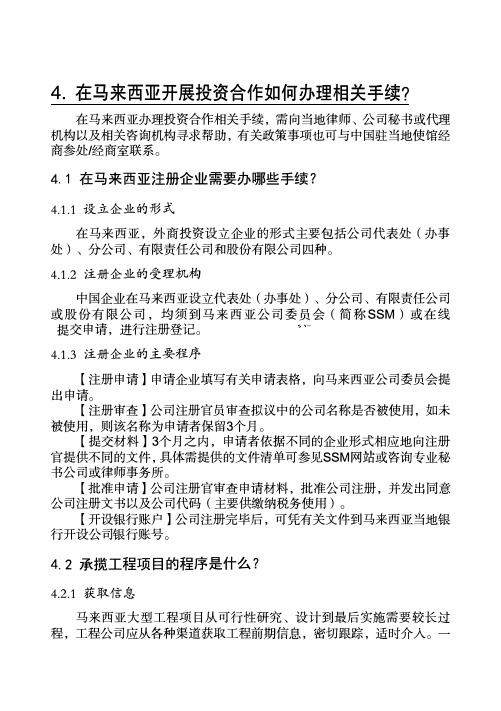
4在马来西亚开展投资合作如何办理相关手续?在马来西亚办理投资合作相关于续,需向当地律师、公司秘书或代理机构以及相关咨询机构寻求帮助,有关政策事项也可与中国驻当地使馆经商参处/经商室联系。
4.1在马来西亚注册企业需要办哪些手续?4.11设立企业的形式在马来西亚,外商投资设立企业的形式主要包括公司代表处(办事处)、分公司、有限责任公司和股份有限公司四种。
4.12注册企业的受理机构中国企业在马来西亚设立代表处(办事处)、分公司、有限责任公司或股份有限公司,均须到马来西亚公司委员会(简称SSM)或在线提交申请,进行注册登记。
4.13注册企业的主要程序[注册申请]申请企业填写有关申请表格,向马来西亚公司委员会提出申请。
[注册审查]公司注册官员审查拟议中的公司名称是否被使用,如未被使用,则该名称为申请者保留3个月。
[提交材料]3个月之内,申请者依据不同的企业形式相应地向注册官提供不同的文件,具体需提供的文件清单可参见SSM网站或咨询专业秘书公司或律师事务所。
[批准申请]公司注册官审查申请材料,批准公司注册,并发出同意公司注册文书以及公司代码(主要供缴纳税务使用)。
[开设银行账户]公司注册完毕后,可凭有关文件到马来西亚当地银行开设公司银行账号。
4.2 承揽工程项目的程序是什么?4.21获取信息马来西亚大型工程项目从可行性研究、设计到最后实施需要较长过程,工程公司应从各种渠道获取工程前期信息,密切跟踪,适时介入。
一般来说,政府出资项目由政府主管部门发布信息,私人项目通过主要报刊定期发布招标及项目信息。
4.2.2招标投标在马来西亚,由世界银行、亚洲开发银行和其他外来资金参与的项目一 一均按国际标准公开招标。
政府财政拨款的 般工程项目, 般把招标对象限定在拥有A级资格的马来西亚本地公司,外国公司需从中分包或合作,大型项目则启动国际招标程序。
私人发展项目招标对象限制较少,但最大的风险是支付保障问题,要慎重选择有实力有信誉的业主。
马来西亚对6项铝制品建材实施进出口强制性标准
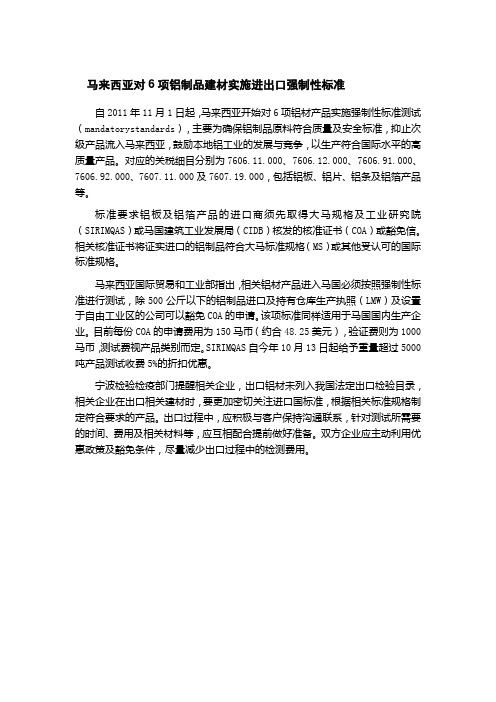
马来西亚对6项铝制品建材实施进出口强制性标准
自2011年11月1日起,马来西亚开始对6项铝材产品实施强制性标准测试(mandatorystandards),主要为确保铝制品原料符合质量及安全标准,抑止次级产品流入马来西亚,鼓励本地铝工业的发展与竞争,以生产符合国际水平的高质量产品。
对应的关税细目分别为7606.11.000、7606.12.000、7606.91.000、7606.92.000、7607.11.000及7607.19.000,包括铝板、铝片、铝条及铝箔产品等。
标准要求铝板及铝箔产品的进口商须先取得大马规格及工业研究院(SIRIMQAS)或马国建筑工业发展局(CIDB)核发的核准证书(COA)或豁免信。
相关核准证书将证实进口的铝制品符合大马标准规格(MS)或其他受认可的国际标准规格。
马来西亚国际贸易和工业部指出,相关铝材产品进入马国必须按照强制性标准进行测试,除500公斤以下的铝制品进口及持有仓库生产执照(LMW)及设置于自由工业区的公司可以豁免COA的申请。
该项标准同样适用于马国国内生产企业。
目前每份COA的申请费用为150马币(约合48.25美元),验证费则为1000马币,测试费视产品类别而定。
SIRIMQAS自今年10月13日起给予重量超过5000吨产品测试收费5%的折扣优惠。
宁波检验检疫部门提醒相关企业,出口铝材未列入我国法定出口检验目录,相关企业在出口相关建材时,要更加密切关注进口国标准,根据相关标准规格制定符合要求的产品。
出口过程中,应积极与客户保持沟通联系,针对测试所需要的时间、费用及相关材料等,应互相配合提前做好准备。
双方企业应主动利用优惠政策及豁免条件,尽量减少出口过程中的检测费用。
马来西亚建材产品SIRIM认证
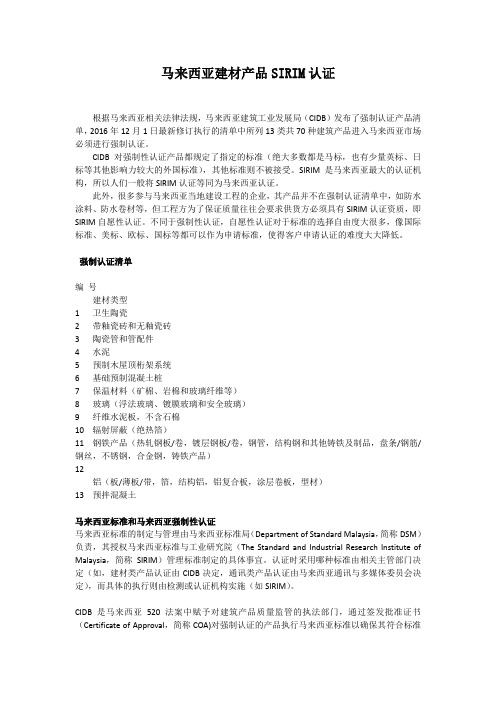
马来西亚建材产品SIRIM认证根据马来西亚相关法律法规,马来西亚建筑工业发展局(CIDB)发布了强制认证产品清单,2016年12月1日最新修订执行的清单中所列13类共70种建筑产品进入马来西亚市场必须进行强制认证。
CIDB对强制性认证产品都规定了指定的标准(绝大多数都是马标,也有少量英标、日标等其他影响力较大的外国标准),其他标准则不被接受。
SIRIM是马来西亚最大的认证机构,所以人们一般将SIRIM认证等同为马来西亚认证。
此外,很多参与马来西亚当地建设工程的企业,其产品并不在强制认证清单中,如防水涂料、防水卷材等,但工程方为了保证质量往往会要求供货方必须具有SIRIM认证资质,即SIRIM自愿性认证。
不同于强制性认证,自愿性认证对于标准的选择自由度大很多,像国际标准、美标、欧标、国标等都可以作为申请标准,使得客户申请认证的难度大大降低。
强制认证清单编号建材类型1卫生陶瓷2带釉瓷砖和无釉瓷砖3陶瓷管和管配件4水泥5预制木屋顶桁架系统6基础预制混凝土桩7保温材料(矿棉、岩棉和玻璃纤维等)8玻璃(浮法玻璃、镀膜玻璃和安全玻璃)9纤维水泥板,不含石棉10辐射屏蔽(绝热箔)11钢铁产品(热轧钢板/卷,镀层钢板/卷,钢管,结构钢和其他铸铁及制品,盘条/钢筋/钢丝,不锈钢,合金钢,铸铁产品)12铝(板/薄板/带,箔,结构铝,铝复合板,涂层卷板,型材)13预拌混凝土马来西亚标准和马来西亚强制性认证马来西亚标准的制定与管理由马来西亚标准局(Department of Standard Malaysia,简称DSM)负责,其授权马来西亚标准与工业研究院(The Standard and Industrial Research Institute of Malaysia,简称SIRIM)管理标准制定的具体事宜。
认证时采用哪种标准由相关主管部门决定(如,建材类产品认证由CIDB决定,通讯类产品认证由马来西亚通讯与多媒体委员会决定),而具体的执行则由检测或认证机构实施(如SIRIM)。
马来西亚对外国投资的市场准入相关规定
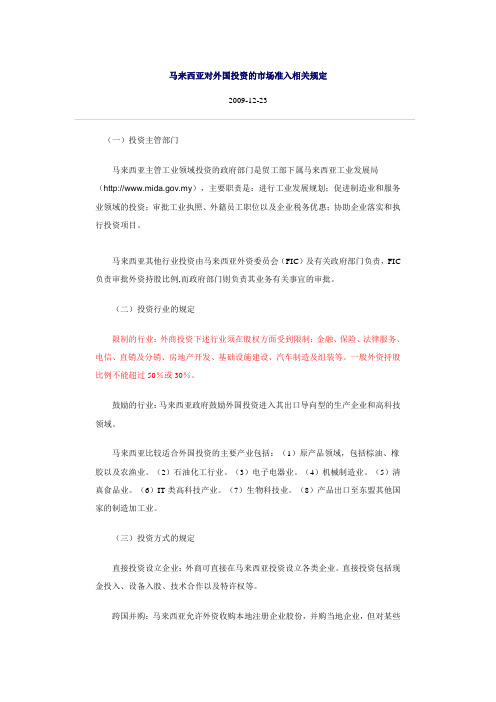
马来西亚对外国投资的市场准入相关规定2009-12-23(一)投资主管部门马来西亚主管工业领域投资的政府部门是贸工部下属马来西亚工业发展局(.my),主要职责是:进行工业发展规划;促进制造业和服务业领域的投资;审批工业执照、外籍员工职位以及企业税务优惠;协助企业落实和执行投资项目。
马来西亚其他行业投资由马来西亚外资委员会(FIC)及有关政府部门负责,FIC 负责审批外资持股比例,而政府部门则负责其业务有关事宜的审批。
(二)投资行业的规定限制的行业:外商投资下述行业须在股权方面受到限制:金融、保险、法律服务、电信、直销及分销、房地产开发、基础设施建设、汽车制造及组装等。
一般外资持股比例不能超过50%或30%。
鼓励的行业:马来西亚政府鼓励外国投资进入其出口导向型的生产企业和高科技领域。
马来西亚比较适合外国投资的主要产业包括:(1)原产品领域,包括棕油、橡胶以及农渔业。
(2)石油化工行业。
(3)电子电器业。
(4)机械制造业。
(5)清真食品业。
(6)IT类高科技产业。
(7)生物科技业。
(8)产品出口至东盟其他国家的制造加工业。
(三)投资方式的规定直接投资设立企业:外商可直接在马来西亚投资设立各类企业。
直接投资包括现金投入、设备入股、技术合作以及特许权等。
跨国并购:马来西亚允许外资收购本地注册企业股份,并购当地企业,但对某些领域,有外资股权限制。
一般而言,制造业、采矿业、超级多媒体地位公司等领域外资可获100%股份。
股票收购:马来西亚股票市场向外国投资者开放,允许外国企业或投资者收购本地上市企业,但须获得马来西亚外资委员会(FIC)同意。
外国投资者在吉隆坡股票交易所购买上市公司的股票,其购买量占上市公司股份5%以下的,不需向证券委员会报告;如购买量达到或超过上市公司股份5%,应通知上市公司秘书,由其向证券委员会报告;购买量达到或超过上市公司股份33.3%,需要获得证券委员会的许可,同时还须向公司其他股东公布收购情况。
马来西亚法制环境通用问题调查清单
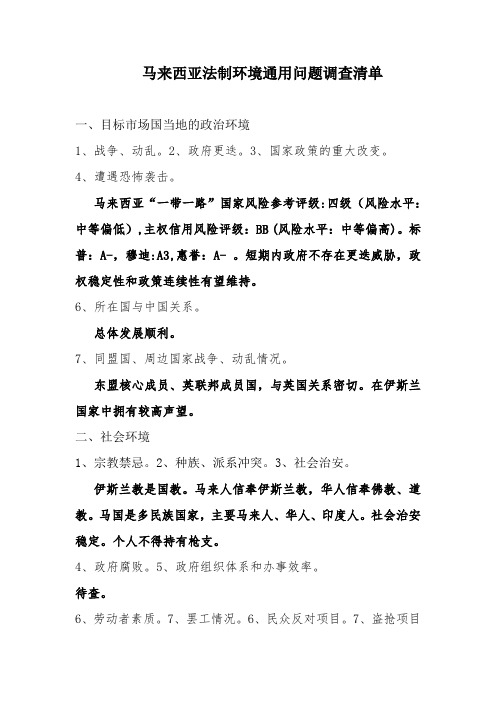
马来西亚法制环境通用问题调查清单一、目标市场国当地的政治环境1、战争、动乱。
2、政府更迭。
3、国家政策的重大改变。
4、遭遇恐怖袭击。
马来西亚“一带一路”国家风险参考评级:四级(风险水平:中等偏低),主权信用风险评级:BB (风险水平:中等偏高)。
标普:A-,穆迪:A3,惠誉:A- 。
短期内政府不存在更迭威胁,政权稳定性和政策连续性有望维持。
6、所在国与中国关系。
总体发展顺利。
7、同盟国、周边国家战争、动乱情况。
东盟核心成员、英联邦成员国,与英国关系密切。
在伊斯兰国家中拥有较高声望。
二、社会环境1、宗教禁忌。
2、种族、派系冲突。
3、社会治安。
伊斯兰教是国教。
马来人信奉伊斯兰教,华人信奉佛教、道教。
马国是多民族国家,主要马来人、华人、印度人。
社会治安稳定。
个人不得持有枪支。
4、政府腐败。
5、政府组织体系和办事效率。
待查。
6、劳动者素质。
7、罢工情况。
6、民众反对项目。
7、盗抢项目劳动者素质普遍低于国内,无正规途径报道罢工、盗抢项目物质的消息。
三、经济状况1、市场国管控:(1)市场国就进出口货物的管控制度。
临时进口限制品:部分电线电缆、部分钢铁产品。
对钢结构进口限制,需符合马来西亚标准,并需获得建筑工业发展委员会(CIDB)的认证,才能进口。
建筑材料,包括陶瓷制品、卫生洁具、水泥、铝、不含石棉的纤维水泥板、隔热材料和玻璃等,海关负责禁止进口所有不符合建筑业发展局规定的建筑材料。
(2)市场国对现金的管控。
境内企业之间的交易原则上不可以以外币支付。
增加了货物贸易强制结汇的规定,但仅针对货物贸易出口商。
(3)市场国市场准入的要求或限制。
通过外资准入、限制外资持股比例、保障原住民持股比例来实现。
(4)行业准入政策,对外资投资比例的限制和要求。
金融、保险、法律服务、电信、直销及分销,外资不超过50%。
2、市场竞争程度。
3、物价上涨。
近期通货膨胀率0.2%。
马来西亚统计局:2018年10月马来西亚消费物价指数同比上涨0.7%。
马来西亚承包工程市场发展潜力预测

承包工程市场发展潜力一、整体市场情况和发展潜力马来西亚承包工程市场整体基础比较好,发展比较稳健。
但由于人口基数少,市场规模不是很大。
伴随着马来西亚最近几年经济增长速度的下滑,工程承包市场的增速也在减少,预计2017年的增长速度为6.6%左右。
二、建筑市场各领域整体状况及前景预测1. 交通运输建设领域马来西亚政府对公共交通运输的建设比较重视,在“十一五”发展规划里,重点发展的交通运输领域项目如表所示(见下页)。
基础设施领域主要由政府投资建设,由于马来西亚政府预算有限,部分交通运输领域的项目采用了PFI(即BOT)模式利用民间资本进行建设,极个别项目采用了国外的优惠贷款。
由于马来西亚基础设施无法满足国家经济的发展,马来西亚在“十一五”规划期间大力发展基础设施建设。
根据BMI(Business Monitor International)的预计,2017年马来西亚交通运输建设领域仍能保持9%的增长速度。
未来几年里,交通运输建设仍是建筑领域经济增长的推动力。
2. 房屋建筑领域马来西亚由于私营经济比较繁荣,房建开发主要依靠私人投资,私人投资占比超过60%。
马来西亚本地开发商数量众多,但是规模普遍不大,最大的开发商实达集团2016年的销售额也只有35亿林吉特。
马来西亚政府为了保障公务员和低收入阶层的住房,也分别推出了PPA1M和Prima两个保障性住房项目,每年开发约10,000套住宅。
另外,随着马来西亚加大对外来投资的吸引力度,越来越多的外国投资商来马来西亚投资开发房建项目,这其中以中国和新加坡的投资为最。
根据中国驻马来西亚使馆经商处的统计,2015年中国对马来西亚投资总额达到400亿人民币,这其中超过60%投资在房地产领域。
2016年马来西亚房建领域吸引了更多的来自中国的投资,这其中包括碧桂园计划投资1,000亿美元建设森林城市项目、中国中铁投资20亿美元收购大马城60%股份来开发这个建筑面积约840万平方米的项目等。
马来西亚国家市场分析

马来西亚国家市场分析马来西亚⼀、宏观环境(⼀)经济环境受投资扩张和内需增长带动,2013年马经济增长4.7%,虽低于2012年的5.6%,但符合马官⽅预期;2014年,马经济预计继续保持稳步增长,增幅在5%-5.5%。
⾃2010年马政府启动经济转型计划(ETP)以来,私⼈投资持续活跃。
2011年,私⼈投资额940亿马币(马来西亚法定货币,亦称令吉或林吉特,1美元约合3.10-3.35马币),2012年达1402亿马币,2013年约1650亿马币,私⼈投资已超过政府投资。
长期以来,马政府对汽油、天然⽓、电⼒、⽩糖等公共产品提供巨额补贴。
近年来,随着公共开⽀⼤幅增加,马政府债务负担⽇益严重。
截⾄2013年9⽉30⽇,马政府债务5292亿马币,占马GDP的53.6%,其中97%为国内债务,接近马财政部设定的55%的债务上限。
为此,⾃2013年10⽉起,政府开始削减汽柴油、电⼒、⽩糖等产品补贴额度,受其影响,其他⽇⽤消费品和部分建筑材料价格随之上涨。
专业机构预测,2014年马CPI将增⾄约3%。
因马总体通胀⽔平较低,且政府削减补贴遵循逐步实施、区别对待的原则,预计不会拖累马经济发展。
(⼆)政治及安全环境马来西亚政局稳定,执政党联盟“国民阵线”长期执政,政策延续性较好。
2013年5⽉,马举⾏第13届全国⼤选,“国民阵线”再次获得多数席位,总理纳吉布获得连任,组建新⼀届内阁。
预计未来五年,马政府将继续把推动经济转型计划、吸引外国投资作为⾸要⽬标,努⼒使马在2020年成为发达国家。
马虽为多种族、多宗教国家,但马来⼈、华裔和印度裔和平相处,民族关系较为融洽,社会治安整体较好。
⼆、承包⼯程市场发展状况(⼀)市场整体状况受政府扩⼤公共基础设施投资影响,近年来马来西亚建筑业增长显著。
2012年,马建筑业总产值253.3亿马币,同⽐增长18.5%,成为马经济中增长最快的⾏业。
其中,基础设施和住宅建设占马建筑业总额的63.9%,成为马建筑业增长的主要市场。
马来西亚建筑市场探析
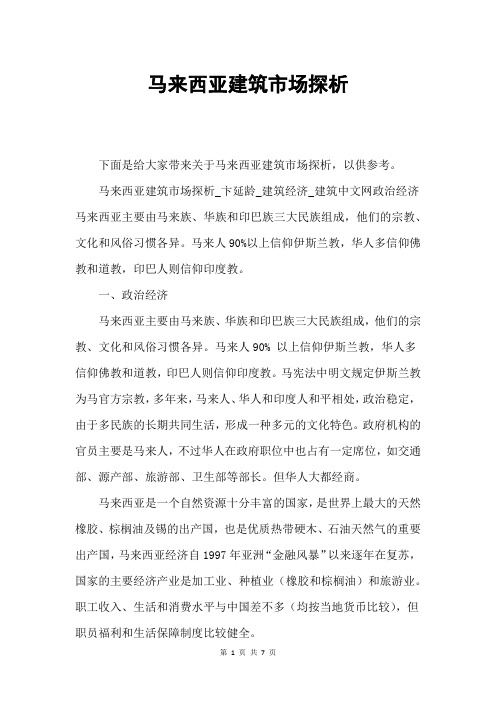
马来西亚建筑市场探析下面是给大家带来关于马来西亚建筑市场探析,以供参考。
马来西亚建筑市场探析_卞延龄_建筑经济_建筑中文网政治经济马来西亚主要由马来族、华族和印巴族三大民族组成,他们的宗教、文化和风俗习惯各异。
马来人90%以上信仰伊斯兰教,华人多信仰佛教和道教,印巴人则信仰印度教。
一、政治经济马来西亚主要由马来族、华族和印巴族三大民族组成,他们的宗教、文化和风俗习惯各异。
马来人90% 以上信仰伊斯兰教,华人多信仰佛教和道教,印巴人则信仰印度教。
马宪法中明文规定伊斯兰教为马官方宗教,多年来,马来人、华人和印度人和平相处,政治稳定,由于多民族的长期共同生活,形成一种多元的文化特色。
政府机构的官员主要是马来人,不过华人在政府职位中也占有一定席位,如交通部、源产部、旅游部、卫生部等部长。
但华人大都经商。
马来西亚是一个自然资源十分丰富的国家,是世界上最大的天然橡胶、棕榈油及锡的出产国,也是优质热带硬木、石油天然气的重要出产国,马来西亚经济自1997年亚洲“金融风暴”以来逐年在复苏,国家的主要经济产业是加工业、种植业(橡胶和棕榈油)和旅游业。
职工收入、生活和消费水平与中国差不多(均按当地货币比较),但职员福利和生活保障制度比较健全。
二、气候环境马来西亚位置近于地球赤道,故其气候为热带气候,无四季之分,常年比较炎热多雨,紫外线照射力强,空气中的湿度非常高,其温度介于 21℃-32℃之间,其中3 月 -5 月最热,10 月下旬开始进入雨季,11月雨量最多,几乎每天一场雷阵雨,持续时间约一小时,到次年1 月中旬结束,这几个月也是较凉快的。
马来西亚的常年平均雨量为2000mm-2500mm。
由于气候的关系,空气新鲜,道路也比较干净。
三、交通马来西亚道路交通较发达,私家车很普遍,在城市几乎每家至少有一辆车,城市的交通经常堵塞。
公共交通不发达,像首都吉隆坡虽然有轻轨、公交车,但乘坐的人不多,利用率不高。
城市的出租业也不发达,出租车不多,还经常拒载。
马来西亚疏浚填海工程资格预审实例
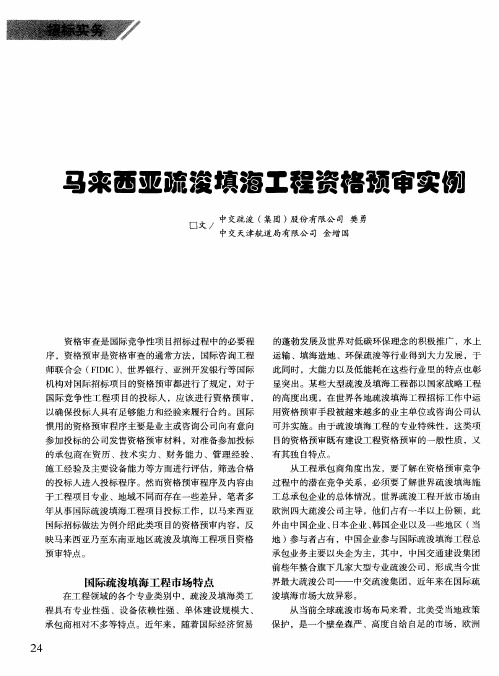
映马来西亚乃 至东南 亚地区疏浚及填海工程项 目资格 地 )参与者 占有 ,中国企业参与 国际疏浚填海工程 总
预 审 特 点
承包业务 主要 以央企为主 ,其 中,中国交通建设集 团
前些年整合旗下几 家大型专业疏浚公司 ,形成 当今世
国 际 疏 浚 填 海 工 程 市 场 特 点
界最大疏浚公 司—— 中交疏浚集团 ,近年来在 国际疏
在工程领域 的各个专业类别 中,疏 浚及填海类工 浚填海市场大放异彩 。
程具有 专业性 强 、设 备依赖 性强 、单体 建设 规模大 、
从 当前全球疏浚市 场布局来看 ,北美受 当地政策
承包商相对不多等特点 。近年来 ,随着 国际经济贸易 保护 ,是一个壁 垒森严 、高度 自给 自足的市场 ,欧洲
长 ,甚至通过某些手段提前 与业 主或咨询公司接触并
按 照马 来西 亚惯 例 ,以上 文件 需提 供公 证 机关
融人 ,利用 自己的优势设 置资格 预审条件 ,从而保证 的国 际公 证或 马来 西 亚本 地政府 机构 核证 真实 副本
入 围
(Certified True Copy)。
此外 ,结合马来 西亚 国情和本 地业主特 殊要求 ,
承包 商 只能着 眼 于承揽 非政 府 主导 的港 口项 目以及 部等 。
填 海项 目。
马来 西亚工程承包市场相对 比较开放 ,但 政府 对 于外 国承包商有一些通用资质要求 ,比如某些 重点项
资格预审条件及要求
1.资格要求。一般来讲 ,资格预审对承包商 的资
以确 保投标人具有足够能力 和经 验来履 行合约。 国际 用资格预审手段被越来越多 的业 主单位 或咨询公司认
惯用 的资格预审程序 主要是业 主或咨询公司向有意 向
马来西亚工业发展局(CIDB)资质要求和流程
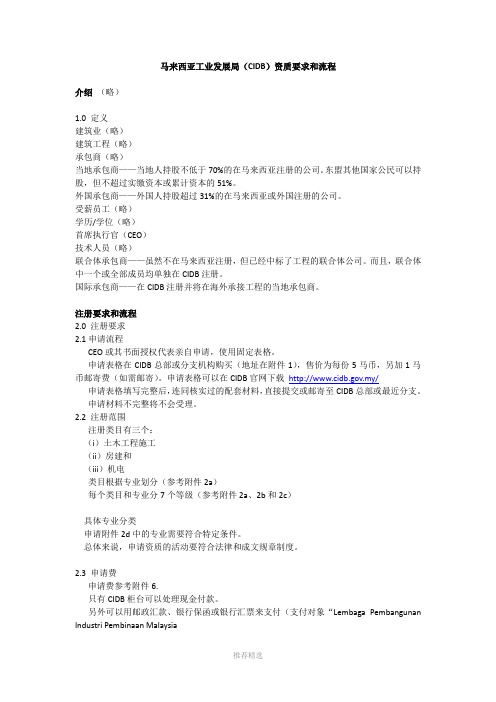
马来西亚工业发展局(CIDB)资质要求和流程介绍(略)1.0 定义建筑业(略)建筑工程(略)承包商(略)当地承包商——当地人持股不低于70%的在马来西亚注册的公司。
东盟其他国家公民可以持股,但不超过实缴资本或累计资本的51%。
外国承包商——外国人持股超过31%的在马来西亚或外国注册的公司。
受薪员工(略)学历/学位(略)首席执行官(CEO)技术人员(略)联合体承包商——虽然不在马来西亚注册,但已经中标了工程的联合体公司。
而且,联合体中一个或全部成员均单独在CIDB注册。
国际承包商——在CIDB注册并将在海外承接工程的当地承包商。
注册要求和流程2.0 注册要求2.1申请流程CEO或其书面授权代表亲自申请,使用固定表格。
申请表格在CIDB总部或分支机构购买(地址在附件1),售价为每份5马币,另加1马币邮寄费(如需邮寄)。
申请表格可以在CIDB官网下载.my/申请表格填写完整后,连同核实过的配套材料,直接提交或邮寄至CIDB总部或最近分支。
申请材料不完整将不会受理。
2.2 注册范围注册类目有三个:(i)土木工程施工(ii)房建和(iii)机电类目根据专业划分(参考附件2a)每个类目和专业分7个等级(参考附件2a、2b和2c)具体专业分类申请附件2d中的专业需要符合特定条件。
总体来说,申请资质的活动要符合法律和成文规章制度。
2.3 申请费申请费参考附件6.只有CIDB柜台可以处理现金付款。
另外可以用邮政汇款、银行保函或银行汇票来支付(支付对象“Lembaga Pembangunan Industri Pembinaan Malaysia”),公司或个人支票不予接受,一旦支付将不能退款。
CIDB有权在不做出通知的情况下修改费率。
2.4 申请表格提交提交申请的必须是公司的CEO,或者公司、一人责任公司、联营单位、协会或合作社等授权办理人。
申请表格和相关费用将提交给附件1中罗列的CIDB地址。
申请人最好亲自提交材料以便核实其完整性。
关于马来西亚工程项目永久许可管理的浅谈

关于马来西亚工程项目永久许可管理的浅谈摘要:随着中国一带一路政策的推行,越来越多的中国企业进入马来西亚市场,对于马来西亚项目繁琐的许可审批程序,本文对马来西亚市场各种工程如何申报各专业的许可做了描述,对国内公司进入马来市场具有指导意义。
本文为项目的每个阶段应该办理完成什么许可提供了基本的指导,以便确保遵守马来政府机关的要求,按项目计划提前审批完成项目许可、准证等。
关键词:马来西亚;工程;施工许可;报检一、前言马来西亚政局稳定,经济平稳友展,政府积极吸引国内外资金,努力完善交通基础设施。
在此背景下,中国企业参与马来西亚基础设施投资与建设,拥有较为广阔的前景。
但是马来西亚繁琐的施工许可办理程序,如不及时办理,不仅消耗大量的施工工期,还会造成人员和设备的窝工,增加项目成本。
在马来西亚主管承包工程的政府部门是建筑业发展局(CIDB)。
承包商与当地发展商签订承包合同后,需要向该局申请办理施工许可证,并由其查验承包公司资质和监督审查项目进展情况。
除CIDB外其他相关部门在工程项目开始前也需要办理各种许可。
二、识别项目许可范围首先要根据ITB招标文件,明确施工单位,PMC办理各类许可的职责矩阵,大体可以按照项目准备阶段、项目施工阶段、预试运、试运、开车及性能测试、项目最终验收这些阶段来划分各参与方的许可范围,完善许可责任矩阵。
表1 许可范围职责矩阵三、项目许可组织机构组建马来西亚项目因民族及宗教原因,中方员工不要直接参与与政府机构的沟通交涉,项目需要招聘有经验的RLO许可官员负责项目的所有许可的办理,与政府机关熟悉的人优先考虑。
同时因为马来西亚政策的原因,项目不直接向政府提交许可类的文件,需要马来西亚当地的第三方咨询公司负责直接向政府各个机关提交各类文件,并与RLO一起与政府沟通交涉,协调完成各类许可的办理工作。
选择好的RLO及当地咨询公司对于项目成本的节省及许可办理的速度至关重要。
图1 典型的许可组织机构四、项目范围的甄别RLO及咨询公司对项目的范围进行研究,识别本项目涉及到的专业及各类设备,甄别出项目涉及到许可及要打交道的政府部门,建立项目许可登记表PERMITTING MASTER REGISTER。
马来西亚CIDB、SIRIM建材认证简介

马来西亚CIDB、SIRIM建材认证简介
根据马来西亚相关法律法规,马来西亚建筑工业发展局(CIDB )发布了强制认证产品清单,2016年12月1日最新修订执行的清单中所列13类共70种建筑产品进入马来西亚市场必须进行强制认证。
马来西亚标准的制定与管理由马来西亚标准局(Department of Standard Malaysia ,简称DSM )负责,其授权马来西亚标准与工业研究院(The Standard and Industrial Research Institute of Malaysia ,简称SIRIM )管理标准制定的具体事宜。
认证时采用哪种标准由相关主管部门决定(如,建材类产品认证由CIDB决定,通讯类产品认证由马来西亚通讯与多媒体委员会决定),而具体的执行则由检测或认证机构实施(如SIRIM )。
CIDB是马来西亚520法案中赋予对建筑产品质量监管的执法部门,除了对施工单位管理和工程验收以外,还负责建材钢铁产品的质量认证工作。
所有需要强制认证的建材钢铁产品在进入马来西亚市场时,必须确定CIDB颁发的COA证书。
也就是我们通常所说的CIDB认证。
马来西亚CIDB认证申请的流程和周期
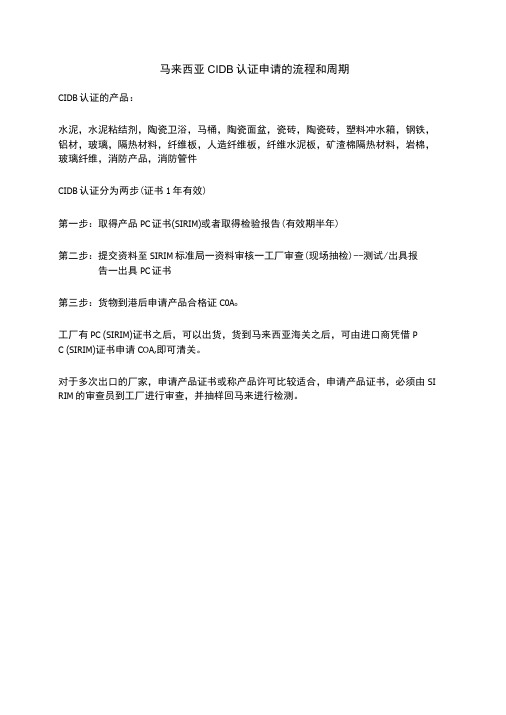
马来西亚CIDB认证申请的流程和周期
CIDB认证的产品:
水泥,水泥粘结剂,陶瓷卫浴,马桶,陶瓷面盆,瓷砖,陶瓷砖,塑料冲水箱,钢铁,铝材,玻璃,隔热材料,纤维板,人造纤维板,纤维水泥板,矿渣棉隔热材料,岩棉,玻璃纤维,消防产品,消防管件
CIDB认证分为两步(证书1年有效)
第一步:取得产品PC证书(SIRIM)或者取得检验报告(有效期半年)
第二步:提交资料至SIRIM标准局一资料审核一工厂审查(现场抽检)--测试/出具报告一出具PC证书
第三步:货物到港后申请产品合格证C0A o
工厂有PC (SIRIM)证书之后,可以出货,货到马来西亚海关之后,可由进口商凭借P
C (SIRIM)证书申请COA,即可清关。
对于多次出口的厂家,申请产品证书或称产品许可比较适合,申请产品证书,必须由SI RIM的审查员到工厂进行审查,并抽样回马来进行检测。
海外项目安全管理之我见
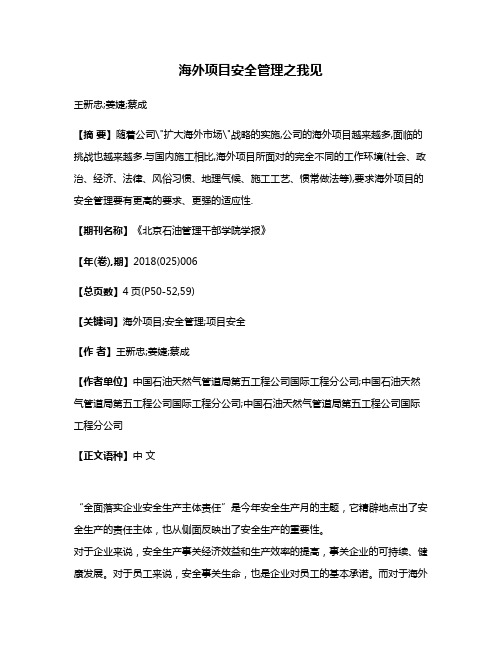
海外项目安全管理之我见王新忠;姜婕;蔡成【摘要】随着公司\"扩大海外市场\"战略的实施,公司的海外项目越来越多,面临的挑战也越来越多.与国内施工相比,海外项目所面对的完全不同的工作环境(社会、政治、经济、法律、风俗习惯、地理气候、施工工艺、惯常做法等),要求海外项目的安全管理要有更高的要求、更强的适应性.【期刊名称】《北京石油管理干部学院学报》【年(卷),期】2018(025)006【总页数】4页(P50-52,59)【关键词】海外项目;安全管理;项目安全【作者】王新忠;姜婕;蔡成【作者单位】中国石油天然气管道局第五工程公司国际工程分公司;中国石油天然气管道局第五工程公司国际工程分公司;中国石油天然气管道局第五工程公司国际工程分公司【正文语种】中文“全面落实企业安全生产主体责任”是今年安全生产月的主题,它精辟地点出了安全生产的责任主体,也从侧面反映出了安全生产的重要性。
对于企业来说,安全生产事关经济效益和生产效率的提高,事关企业的可持续、健康发展。
对于员工来说,安全事关生命,也是企业对员工的基本承诺。
而对于海外项目而言,安全已经成为队伍能否进入国际服务市场首先必须跨越的一道门槛;没有高标准的安全管理体系和良好的业绩就很难通过招投标资格预审,更别说拿到项目合同。
一、海外项目安全管理特点(一)HSE 标准高表现在承包商被总包商、业主所要求执行的HSE 标准往往比自身的标准高,更多的表现在对标准的执行过程要求更严格。
(二)内容更复杂,管理难度大海外项目安全管理覆盖面广,不仅要求做好生产安全管理,而且要做好营地及基地建设,员工的吃喝拉撒睡样样都得管。
人员不仅有中方的,还有当地雇员和其他国籍的人员,每天必须处理和应对来自不同国家和地区的不同文化习俗和做法。
(三)后勤支持受限海外项目远离祖国和公司总部,在技术、设备、人员、物资等资源的支持保障上经常受到主客观因素的影响,所需资源不能及时到位。
马来西亚汽车市场准入.
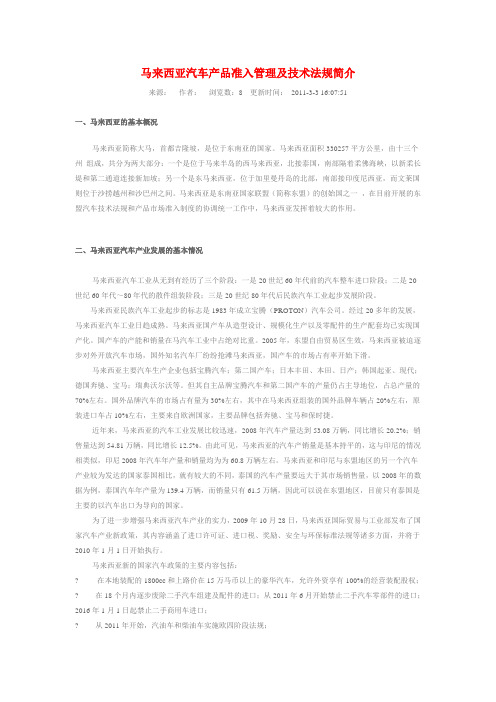
马来西亚汽车产品准入管理及技术法规简介来源:作者:浏览数:8 更新时间:2011-3-3 16:07:51一、马来西亚的基本概况马来西亚简称大马,首都吉隆坡,是位于东南亚的国家。
马来西亚面积330257平方公里,由十三个州组成,共分为两大部分:一个是位于马来半岛的西马来西亚,北接泰国,南部隔着柔佛海峡,以新柔长堤和第二通道连接新加坡;另一个是东马来西亚,位于加里曼丹岛的北部,南部接印度尼西亚,而文莱国则位于沙捞越州和沙巴州之间。
马来西亚是东南亚国家联盟(简称东盟)的创始国之一,在目前开展的东盟汽车技术法规和产品市场准入制度的协调统一工作中,马来西亚发挥着较大的作用。
二、马来西亚汽车产业发展的基本情况马来西亚汽车工业从无到有经历了三个阶段:一是20世纪60年代前的汽车整车进口阶段;二是20世纪60年代~80年代的散件组装阶段;三是20世纪80年代后民族汽车工业起步发展阶段。
马来西亚民族汽车工业起步的标志是1983年成立宝腾(PROTON)汽车公司。
经过20多年的发展,马来西亚汽车工业日趋成熟。
马来西亚国产车从造型设计、规模化生产以及零配件的生产配套均已实现国产化。
国产车的产能和销量在马汽车工业中占绝对比重。
2005年,东盟自由贸易区生效,马来西亚被迫逐步对外开放汽车市场,国外知名汽车厂纷纷抢滩马来西亚,国产车的市场占有率开始下滑。
马来西亚主要汽车生产企业包括宝腾汽车;第二国产车;日本丰田、本田、日产;韩国起亚、现代;德国奔驰、宝马;瑞典沃尔沃等。
但其自主品牌宝腾汽车和第二国产车的产量仍占主导地位,占总产量的70%左右。
国外品牌汽车的市场占有量为30%左右,其中在马来西亚组装的国外品牌车辆占20%左右,原装进口车占10%左右,主要来自欧洲国家,主要品牌包括奔驰、宝马和保时捷。
近年来,马来西亚的汽车工业发展比较迅速,2008年汽车产量达到53.08万辆,同比增长20.2%;销售量达到54.81万辆,同比增长12.5%。
- 1、下载文档前请自行甄别文档内容的完整性,平台不提供额外的编辑、内容补充、找答案等附加服务。
- 2、"仅部分预览"的文档,不可在线预览部分如存在完整性等问题,可反馈申请退款(可完整预览的文档不适用该条件!)。
- 3、如文档侵犯您的权益,请联系客服反馈,我们会尽快为您处理(人工客服工作时间:9:00-18:30)。
马来西亚工业发展局(CIDB)资质要求和流程介绍(略)1.0 定义建筑业(略)建筑工程(略)承包商(略)当地承包商——当地人持股不低于70%的在马来西亚注册的公司。
东盟其他国家公民可以持股,但不超过实缴资本或累计资本的51%。
外国承包商——外国人持股超过31%的在马来西亚或外国注册的公司。
受薪员工(略)学历/学位(略)首席执行官(CEO)技术人员(略)联合体承包商——虽然不在马来西亚注册,但已经中标了工程的联合体公司。
而且,联合体中一个或全部成员均单独在CIDB注册。
国际承包商——在CIDB注册并将在海外承接工程的当地承包商。
注册要求和流程2.0 注册要求2.1申请流程CEO或其书面授权代表亲自申请,使用固定表格。
申请表格在CIDB总部或分支机构购买(地址在附件1),售价为每份5马币,另加1马币邮寄费(如需邮寄)。
申请表格可以在CIDB官网下载.my/申请表格填写完整后,连同核实过的配套材料,直接提交或邮寄至CIDB总部或最近分支。
申请材料不完整将不会受理。
2.2 注册范围注册类目有三个:(i)土木工程施工(ii)房建和(iii)机电类目根据专业划分(参考附件2a)每个类目和专业分7个等级(参考附件2a、2b和2c)具体专业分类申请附件2d中的专业需要符合特定条件。
总体来说,申请资质的活动要符合法律和成文规章制度。
2.3 申请费申请费参考附件6.只有CIDB柜台可以处理现金付款。
另外可以用邮政汇款、银行保函或银行汇票来支付(支付对象“Lembaga Pembangunan Industri Pembinaan Malaysia”),公司或个人支票不予接受,一旦支付将不能退款。
CIDB有权在不做出通知的情况下修改费率。
2.4 申请表格提交提交申请的必须是公司的CEO,或者公司、一人责任公司、联营单位、协会或合作社等授权办理人。
申请表格和相关费用将提交给附件1中罗列的CIDB地址。
申请人最好亲自提交材料以便核实其完整性。
CIDB只会根据申请表上的信息办理。
申请人最好直接提交所实施项目的业主/监理牌照,并且用信封装好,写上“机密”(CONFIDENTIAL)字样,与申请表格一同提交。
在办理过程中,CIDB可能会向银行或者业主/监理索取信息,由此产生的服务费用由申请人承担。
2.5 文件验证承包商提供的资质支持性文件都要通过如下验证:(i)文件的发出机构,或者(ii)被授权人(公司负责任,公司所有人,公司秘书)申请人请根据所从事的业务,参考附件7(i)、7(ii)和7(iii)提交支持性文件。
2.6 办理时间正常状态下,如果申请材料完整并有序,申请人将在获得申请编号后的14天内得到处理结果的通知。
2.7 申请结果的通知申请结果将通过柜台领取或者邮寄的办法送达申请人。
申请结果通知信需要公司所有人/负责人或授权代表在CIDB柜台领取。
承包商的资质申请结果包括如下几种:2.7.1 同意同意表明,CIDB已经考虑并同意申请。
申请人在支付资质资质费前需要认真阅读同意信内容和条件。
2.7.2 有条件的同意有条件的同意表明,CIDB已经考虑并决定在符合信中所述条件的前提下同意申请。
申请人在支付资质注册费前需要认真阅读同意信内容和条件。
2.7.3 拒绝拒绝表明,由于不符合申请要求CIDB无法考虑该申请。
如果确实符合条件,申请人也可以申诉或向CIDB重新提出申请。
2.8 资质注册费用资质申请在费用支付后才会被考虑。
办理费参考附件6.资质费用将在同意信中说明,并且在同意信发出之日起的90日内支付,否则同意结果将在无通知的情况下自动失效。
如果资质注册费尚未支付,同意信不能作为承包商的资质证书。
通过邮政汇款、银行保函或银行汇票支付的,收款人为“Lembaga Pembangunan Industri Pembinaan Malaysia”。
现金支付只能在CIDB柜台处理,并且不接受私人或公司支票。
2.9 资质证书成功申请者将得到相关等级、类目和专业的资质,并得到相应的证书。
请参考附件2a,2b 和2c。
3.0 资质注册资格3.1 公司注册处的状态3.1.1 公司注册申请人必须先在马来西亚相关部门注册公司,方可以申请CIDB注册。
注册要求如下:—马来西亚公司委员会(公司注册)—合作社或社团的注册处—工商执照—表1(Sarawak)—公司执照—表B(Sabah)公司、企业、合作社和社团的活动需要包括下列文件中罗列的建筑项目:—公司注册(备忘录和公司章程)—商业注册(表A)—合作社或社团的规章—表1(Sarawak)—表B(Sabah)3.2 申请资格建筑承包商的资质申请只能由CEO提出。
该CEO至少要有2年的建筑业经验。
如果该CEO 没有相关资质,则CEO可以任命代表行使CEO的职责。
CEO或其授权代表全面负责资质证书相关事务。
该CEO要先在CIDB注册获得有效的建筑业个人注册卡。
3.3 财务能力在其资质注册期间,申请人要持续拥有足够的财务资源。
最低财务要求参考附件3.3.3.1 财务能力评估申请人的财务能力将通过其业务类型和所提供的资料评估。
3.3.1.1 私人有限/有限公司申请人的财务能力将通过实缴资本总额来评估。
3.3.1.2 一人公司或联合体申请人的财务能力将通过净资本总额来评估,包括以下部分或全部:(i)账户流水近三个月的账户流水。
(ii)固定存款不作为任何银行的担保款项,并且尚未到期。
(iii)透支贷款申请人的透支贷款(需要银行出具的过去三个月的透支贷款)(iv)储蓄账户包括储蓄账户、ASB信托投资,BSN高端储蓄证书或最新的Tabung Haji账户(注:朝圣委员会账户)(其中之一或全部)3.3.1.3 合作社/社团申请人的财务能力将通过成员的共同资本来评估,参考文件为最新的审计账户。
3.4 技术资格承建工程的技术人员必须是马来西亚公民(CIDB认证)技术人员要符合附件3的要求。
技术人员不能受雇于申请人之外的其他雇主。
技术人员要在CIDB注册,并取得有效的建筑人员注册卡。
3.5 其他要求申请人要遵守CIDB发出承包商的注册证书的相关要求和条件。
3.5.1 承包商的诚信课程在CIDB注册后,承包商需要在获得资质证书后1年内参加为期1天的承包商的诚信课程,并取得出席证书。
CEO或下列人员必须参加该课程:a. 公司所有人,b,董事,c,董事长,或d,CEO的代表资质证书的首次延期必须出示该出席证书,否则不予受理。
课程相关信息请联系CIBD的任意机构或分支。
3.5.2 CCD点数资质证书的延期审批根据申请人累计的CCD点数而定,参考附件4.申请人要根据附件5提交诸如参与证书、出席证书、支持函等作为CCD点数的证明。
CCD点数相关信息请联系CIBD的任意机构或分支。
3.6 资质证书的重新颁发证书遗失或受损的话,需要提供法定声明或警察局报告以及100马币的费用,以申请重新颁发证件。
3.7 资质证书的副本如需要资质证书副本,申请人要想CIDB提交申请信以及20马币每份的费用。
如果直接在CIDB柜台申请,则无需申请信。
3.8 资质的类别状态申请人要提供在过往承包商的资质资质期间所承建的工程信息,以确定新的等级。
CIDB有权根据所提供的资料来定等级,分为如下几个情况:a)活跃:本地承包商在资质有效期间有承接工程。
承包商有经验,并且认真从事该行业。
b)半活跃:承包商在资质有效期间没有中标工程,但一直有投标。
c)休眠:承包商在资质有效期间没有中标工程,也没有投标。
d)新人:刚刚注册的承包商。
承包商可以在任何时间提交变更资质等级的舌尖轻,只要向CIDB总部或分支提交原始资质证书并提供工程或投标的证明材料(得到验证的)即可。
变更资质证书免费。
3.9 注销承包商的资质证书只有资质证书的持有者可以提出注销证书的申请。
申请人要向CIDB提交申请书,如果证书持有人超过一个,还需要全部持有人的书面同意。
尚未过期的资质证书需要交还给CIDB。
注销了资质证明的公司在12个月内不能重新激活该证书(获取证书)。
4. 基本要求a.承包商的资质证书是CIDB的财产,CIDB有权注销、撤回、暂停发出的资质证书。
如果CIDB提出要求,证书持有人应随时返还。
b 证书持有人在资质期间有责任遵守注册要求,马来西亚建筑业发展委员会决议和相关规章以及其他成文法律。
c 承包商要始终遵守CIDB发出的指令和通知,无论是书面形式的还是电子形式的。
通过邮寄、新闻公告、网站或其他一切媒介或方式公布的指令和通知都被视为已经传达给承包商。
提交给CIDB的所有信息和文档都属于CIDB,CIDB有权在有利于行业发展的范围内使用和传播这些信息。
d 在CIDB发出信息索取要求或同意信之后的90天内,申请人必须提交相应信息或领取资质证书,否则申请作废,日后只能重新申请。
5 资质证书的暂停、注销和撤回(a)对于违反(b)条的承包商,CIDB有权自行或在其他方可靠投诉的基础上暂停、注销或撤回资质证书。
(b)以下情况可以导致资质证书的暂停、注销和撤回:(i)证书持有人宣布破产;或(ii)承包商面临申诉;或(iii)证书持有人没有遵守相关决议、条例;或(iv)证书持有人通过弄虚作假获得证书;或(v)证书持有人弃置在建工程;或(vi)证书持有人被法庭或根据法律发起的调查组织认定在施工中犯有疏忽罪;或(vii)证书持有人不遵守CIDB的规定、要求或约束。
(c)在下列情况下,承包商的资质会被自动注销:(i)公司注册处的注册过期,除非在过期后1个月内向公司注册处提出延期申请。
(ii)承包商在能源委员会的资质失效,除非在过期后2周内提出延期申请。
(iii)一人公司的负责人死亡,除非亲属或监护人在其死亡后1个月内向CIDB提出申请,资质有效期延长到在建工程完工为止。
(iv)联合体公司的其中一方死亡或者联合体解体,除非余下方在死亡或解体后的1个月内向CIDB申请将有效期延长至在建工程完工之日和原资质有效期结束之日中较早一个。
(d)在CIDB注销、暂停或撤回资质证书之前,必须:(i)向承包方提出书面申诉;并(ii)让承包方有机会提交书面届时;(除非发生(c)条所述情况)(e)如果资质证书被注销、暂停或撤回,承包商不能再参加投标或继续进行在施工程。
(f)CIDB在特定条件下可以允许资质证书被注销的承包商继续完成在施工程。
6 注册承包商的责任6.1 注册条件6.1.1基本条件(a)资质证书不能转让。
(b)CIDB有权随时评估承包商的等级。
6.1.2 承包商的义务和责任(a)承包商必须遵守建筑业发展委员会1994年决议(简称“决议”),规整制度和CIDB 所制定的条件、要求和限制。
(b)一旦证书到期并且未延期,承包商不能在从事投标或者施工活动。
(c)承包商不能承接超出资质等级和类别要求的工程。
